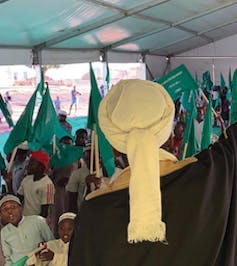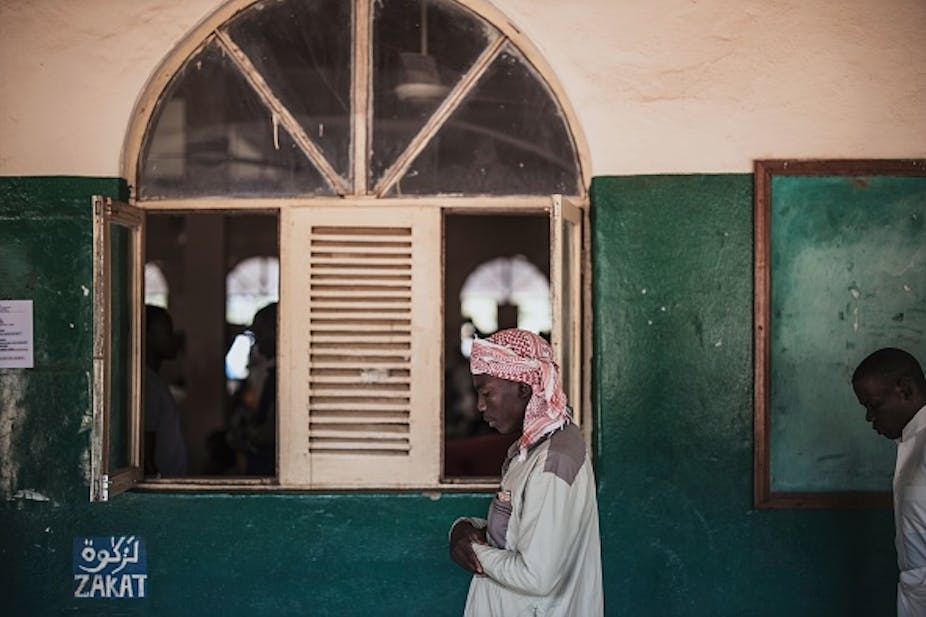Mozambique is a multi-religious southern African nation with excellent relations between faiths. Relations between Muslims and the state have been good too. But the situation became more complicated in 2017 when a bloody jihadist insurgency broke out in the north. Eric Morier-Genoud has published extensively on politics and religion in Mozambique. His latest book, Towards Jihad? Muslims and Politics in Postcolonial Mozambique, looks at the historical relationship between Islam and politics in the country. He fielded some questions from The Conversation Africa.
When was Islam introduced to Mozambique?
Islam has a very old presence in Mozambique. It is estimated to have arrived within the first century of the start of the faith, with Arab, Ottoman and Persian traders. It settled at once during and after the 8th century among new Swahili networks, cultures and societies that developed on the east African coast between Somalia and what is today Mozambique.
Expansion of the Islamic faith inland was slow and only made significant progress in the 19th and 20th centuries. This was the time when European colonial powers occupied Africa, building new infrastructure such as roads and railways that helped the spread of different faiths.
At independence in 1975, Muslims represented 15% of the population of Mozambique. The latest census indicates it stood at 19% in 2017. Today Muslims live mostly on the coast and in the north of the country. A majority of the population of Niassa and Cabo Delgado provinces are Muslim, as are 40% of the population of Nampula province.
What’s been the political experience of Muslims since independence?
A majority of Muslims, like all other religious people in the country, were in favour of independence. But when Frelimo, the liberation movement, came to power at independence in 1975, its policy was socialist-oriented and the government turned against religion. Frelimo saw faith as a superstition and an impediment to its programme. It closed churches near state and educational institutions, restricted religious practice, and even ran atheist campaigns between 1978 and 1980.
In the 1980s, the Frelimo party-state shifted towards tolerance, meaning a policy of minor religious restrictions and a strict separation between state and church/mosque. Frelimo party members were prohibited from being members of a religious institution. Faith institutions were ordered to focus on religion only.
In the 1990s, after the end of the Cold War and the official abandonment of socialism, the Frelimo government moved towards a freer religious regime.
Nevertheless, the post-socialist 1990 constitution did not allow political parties based on regionalism, ethnicity or religion. So there’s a limit to what Muslims can do politically for their faith.
A law to recognise Muslim religious holidays in the 1990s was blocked by the Supreme Court in the name of secularism. Muslims argued this was unfair since Christmas is an official holiday, although called “family day”.

Similarly in the 2000s Muslim politicians (organised in a formal cross-party lobby in parliament) struggled to influence a new law to define the family, inheritance rights and women’s rights.
Consequently, many Islamic organisations and politicians have moved away from politics in the last two decades, to focus on education, social works and proselytism.
What led to the current insurgency?
There is much debate about the causes of the jihadi insurgency in northern Mozambique. Researchers have identified poverty, youth marginalisation, ethnicity and religion as push factors.
The pull factor is a jihadi project of more justice and equality through sharia law and a caliphate. It offers an alternative plan for state and society, and a path to it through violence. The insurgency developed regionally (in connection with Tanzanian jihadis) and the insurgents connected formally to the Islamic State, the international terrorist group, in early 2018.
Read more: Mozambican terror group is strikingly similar to Nigeria's deadly Boko Haram
My book shows that the overwhelming majority of Muslims in Mozambique do not want full sharia law and a caliphate. Nor do they accept the violence used to achieve these objectives.
The insurgents have nevertheless settled militarily in the extreme north, where they have established bases in deep forests and rely on Islamic State for some technical support and public relations.
What support, if any, do the insurgents enjoy in Mozambique?
Insurgents enjoy hardly any support nationally. Locally, they draw some support from networks they established, from long-held local grievances, and from mistakes the state, the army and the police have made since the start of the conflict.
Other dynamics have come into play, including displacement, violence, uncertainty and fear. Today, the “Al-Shabaab” insurgents (as they are known in Mozambique) operate in a territory of about 30,000 square kilometres which represents less than half of the province of Cabo Delgado (one of the 11 provinces of Mozambique).
This is a very limited territory, but one where crucial economic projects are located. Among others, private investment is unfolding for the production of onshore and offshore LNG gas, and companies have developed graphite projects that have turned Mozambique into the second largest world producer of this mineral.
The insurgents have hardly expanded since they began their armed insurrection in October 2017. In 2021 they carried out attacks in Niassa and Nampula, but they withdrew rapidly. It is not clear whether they chose not to expand, or whether the government and its international allies have been effective in containing them. Still, the armed conflict continues today, six years on.
How can the peace be restored?
This is a topic of debate. The government has been active mostly militarily, with an international intervention since 2021. It wants to root out those it calls international “terrorists”.
Many commentators and partners of Mozambique believe that to resolve the conflict, one also needs to address the root causes: poverty, youth marginalisation and ethnicity. Donors and the Mozambican government have started social and economic programmes focusing on youth and on economic development in the north of Mozambique. Even private companies such as TotalEnergie want to engage in such programmes.
Read more: Catalogue of failures behind growing humanitarian crisis in northern Mozambique
An element which has not been touched upon yet relates to the pull factors. There are several possibilities. One would be for the state and civil society to develop a reflection and consultation about the future of the country and about inclusion and representation. It could look at social, economic, political, historical, cultural, and religious elements, aiming to establish a medium-term “agenda for the nation”.

